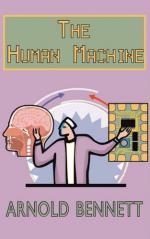And all the while as you read this you are saying, with your impatient sneer: ‘It’s all very well; it’s all very fine talking, but ...’ In brief, you are not convinced. You cannot deracinate that wide-rooted dogma within your soul that more money means more joy. I regret it. But let me put one question, and let me ask you to answer it honestly. Your financial means are greater now than they used to be. Are you happier or less discontented than you used to be? Taking your existence day by day, hour by hour, judging it by the mysterious feel (in the chest) of responsibilities, worries, positive joys and satisfactions, are you genuinely happier than you used to be?
I do not wish to be misunderstood. The financial question cannot be ignored. If it is true that money does not bring happiness, it is no less true that the lack of money induces a state of affairs in which efficient living becomes doubly difficult. These two propositions, superficially perhaps self-contradictory, are not really so. A modest income suffices for the fullest realisation of the Ego in terms of content and dignity; but you must live within it. You cannot righteously ignore money. A man, for instance, who cultivates himself and instructs a family of daughters in everything except the ability to earn their own livelihood, and then has the impudence to die suddenly without leaving a penny—that man is a scoundrel. Ninety—or should I say ninety-nine?—per cent. of all those anxieties which render proper living almost impossible are caused by the habit of walking on the edge of one’s income as one might walk on the edge of a precipice. The majority of Englishmen have some financial worry or other continually, everlastingly at the back of their minds. The sacrifice necessary to abolish this condition of things is more apparent than real. All spending is a matter of habit.
Speaking generally, a man can contrive, out of an extremely modest income, to have all that he needs—unless he needs the esteem of snobs. Habit may, and habit usually does, make it just as difficult to keep a family on two thousand a year as on two hundred. I suppose that for the majority of men the suspension of income for a single month would mean either bankruptcy, the usurer, or acute inconvenience. Impossible, under such circumstances, to be in full and independent possession of one’s immortal soul! Hence I should be inclined to say that the first preliminary to a proper control of the machine is the habit of spending decidedly less than one earns or receives. The veriest automaton of a clerk ought to have the wherewithal of a whole year as a shield against the caprices of his employer. It would be as reasonable to expect the inhabitants of an unfortified city in the midst of a plain occupied by a hostile army to apply themselves successfully to the study of logarithms or metaphysics, as to expect a man without a year’s income in his safe to apply himself successfully to the true art of living.




